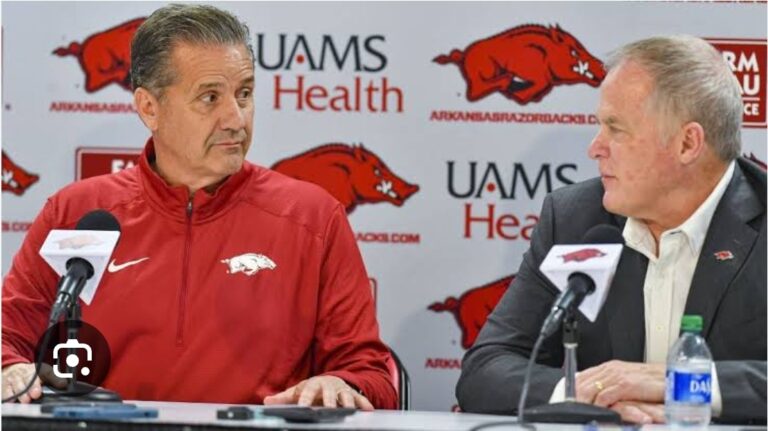In the world of college basketball, few figures are as prominent as Coach John Calipari of the Arkansas Razorbacks. Known for his intense coaching style and remarkable track record, Calipari has built a reputation not only as a leader but also as a fierce advocate for his players and staff. Recently, however, tensions have erupted between Calipari and Athletic Director Hunter Yurachek over the matter of salary increments for coaching staff.
Calipari’s frustrations appear to stem from what he perceives as inadequate support from the athletic department in compensating his assistant coaches and staff. In a highly competitive landscape where financial resources can determine the success of a program, Calipari believes that a commitment to investing in the coaching staff is paramount. The argument is not solely about money; it’s about the message it sends regarding the university’s dedication to maintaining a championship-caliber program.
The dispute escalated when Calipari learned that despite the impressive revenue generated by the basketball program, including merchandise sales, ticket revenues, and lucrative media deals, significant raises for his assistant coaches were not forthcoming. Assistant coaches play a critical role in player development and game strategy, and their compensation directly affects the program’s ability to attract top talent. Calipari has emphasized that retaining quality coaches is vital for long-term success, and he feels that the current administration is not aligning its financial support with the program’s ambitions.
Publicly, Calipari has always presented a united front with the athletic department, but behind closed doors, the frustration has become palpable. Sources close to the situation reveal that the relationship between Calipari and Yurachek has become strained. Calipari’s aggressive stance comes from a place of deep loyalty to his staff and a desire to ensure that they are compensated fairly for their hard work. He has argued that a strong coaching staff is essential not only for winning games but also for building a program that can sustain excellence over the years.
Yurachek, on the other hand, faces the difficult task of balancing the budget while maintaining competitive salaries for all sports programs at the university. The financial landscape of college athletics has become increasingly complex, with rising costs and limited revenues impacting decision-making. While Yurachek understands the importance of investing in the basketball program, he must also consider the broader implications for other sports and the university’s financial health.
This conflict highlights a larger issue within college athletics: the pressure to win versus the fiscal responsibility of the institution. Calipari’s aggressive approach is emblematic of a coach who feels the weight of expectations from fans, alumni, and the broader university community. The stakes are high in a program like Kentucky’s, where success on the court is expected and celebrated.
As the situation develops, the resolution will likely require open dialogue and compromise. Both Calipari and Yurachek must navigate the complexities of their respective roles while keeping the university’s best interests in mind. Ultimately, the outcome will shape the future of the program and influence recruitment, retention, and overall team performance.
In summary, the tension between Coach Calipari and Athletic Director Yurachek is not just about salary increments; it reflects deeper issues within college athletics concerning resource allocation, loyalty, and the pursuit of excellence. As both parties work towards a resolution, the focus will remain on how to best support the Kentucky basketball program in its quest for continued success.


